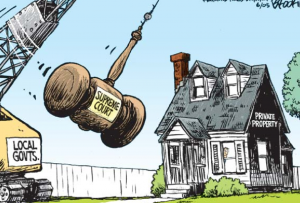 June 23 marked the 10th anniversary of Kelo v. City of New London, a U.S. Supreme Court decision that stripped away certain protections against eminent domain abuse by the government. Now, the Forest Landowners Association (FLA) is encouraging Congress to support a proposal to restore some protection from eminent domain abuse from the federal government.
June 23 marked the 10th anniversary of Kelo v. City of New London, a U.S. Supreme Court decision that stripped away certain protections against eminent domain abuse by the government. Now, the Forest Landowners Association (FLA) is encouraging Congress to support a proposal to restore some protection from eminent domain abuse from the federal government.
H.R. 510, the Defense of Property Rights Act, sponsored by Rep. Tom Reed (R-New York) is an initiative – first introduced in Congress on Jan. 2 – to establish uniform and more efficient Federal process for protecting property owner’s rights guaranteed by the Fifth Amendment. To write a Congressman on this matter, simply visit http://forestamerica.org/content/take-action and follow the on-screen prompts.
In Kelo v. City of New London, the Supreme Court held that “economic development” constituted a “public use” that justified the taking of private property through eminent domain. According to this decision, the government can utilize eminent domain to seize property whenever it is deemed necessary for “economic development.”
After the Court’s ruling on the case, the City of New London, Conn., confiscated Ms. Kelo’s home so that Pfizer, a pharmaceutical corporation, could build a new facility. The city claimed that seizing this property under eminent domain was necessary to complete a “redevelopment project.”
“This is not what our Founding Fathers had in mind when they drafted the Fifth Amendment,” Rep. Reed wrote in a June 23 editorial on the case. “The Kelo decision is based on the premise that “Big Government” is more capable of determining what serves the best interest of local landowners than the landowners themselves.”
The bill includes several provisions to protect landowners private property rights, which the Forest Landowners Association, noted are critical for private forest landowners across the United States. Among other things, H.R. 510:
- Provides an opportunity for citizens to seek compensation when government action significantly impairs the value of their property.
- Promotes accountability and responsible policymaking by forcing the government to provide compensation to affected property owners as a result of infringing on their constitutionally protected property rights. Today, those individuals are not eligible for relief because the government did not render their property entirely “value-less.”
- Addresses the issue of jurisdiction by streamlining the federal court process and providing concurrent federal and state review. This helps return fundamental fairness to the system and provides a means for aggrieved property owners to pursue such action in a court of the citizen’s choosing, not the government’s.
H.R. 510 does not currently have any co-sponsors, and no major action on the measure is expected in the near future. However, Rep. Reed has not slowed his promotion of private property rights among his colleagues. In May, shortly after his introduction of the bill, Rep. Reed established the Private Property Rights Caucus to educate members of congress on the importance of private property rights. The first round table meeting of the Caucus included fourteen members of Congress from eleven states.
“We are hearing not only from New Yorkers but from Americans across the country about how important it is to defend the rights of property owners from an overreaching federal government,” Reed stated in a May 2 announcement about the Caucus. “The Private Property Rights Caucus will provide a platform to educate Members of Congress on the egregious actions that government at all levels imposes on property owners and how we can protect property owners’ Constitutional rights as granted by the Fifth Amendment.”
FLA continues to encourage its members and the forestry community at large to urge members of congress to join the Private Property Rights Caucus and to co-sponsor H.R. 510. To write a Congressman on this matter, simply visit http://forestamerica.org/content/take-action and follow the on-screen prompts.

